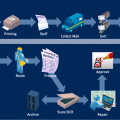Painkiller detox in Florida has evolved to reflect the modern realities of addiction. Every week, newspapers and broadcasts tell of record cases of opioid overdoses and deaths. While usage and levels of addiction have increased to alarming numbers, sensationalism in the media paints a bleak picture that leaves addicts and their families feeling fearful and hopeless. The stigma of opioid use and stereotypical picture of what an addict is further reduce the chances that one will seek treatment.
Biggest Miscinceptions of Recovery
In the past, schools and even some drug counselors have attempted to use hyperbolic statements, misinformation and fear as deterrents. These methods do little to dissuade people from using in the first place, and those who have first-hand experience know the reality better than most. Here are some common misconceptions about that need to be shot down once and for all.
Addicts Are Morally Bankrupt
There are an estimated 1 in 10 Americans coping with addiction, so you can be sure that every demographic is well-represented. It’s easy to marginalize the addict or write them off as someone who’s morally weak and lacks self-control because it allows us to think that it can never happen to us or someone close to us. The fact is that addicts come in all shapes and sizes. They are teachers, doctors and home makers. They can be among your friends, neighbors and family members. Addiction is not a moral failing on the part of the addict.
The Myth of Rock Bottom
One of the biggest misconceptions of recovery is that you have to hit the skids before you can finally overcome your addiction. For some, death by overdose comes long before they’ve lost it all. The biggest determining factor in recovery is not how low you’ve sunk, but how much your addiction affects your life, how determined you are to take control again and how soon you reach the point where you say “Enough!” That point is different for everyone. Some people can lose everything and still remain active substance abusers, while others reach their turning point much earlier in the cycle of addiction.
You Can Stop Any Time

Addiction is defined by The National Institute on Drug Abuse (NIDA) as “an enduring condition that triggers the user to compulsively search out and use substances.” Drugs and alcohol affect us psychologically, emotionally and physically. While there are some people who can go cold turkey and never look back, those numbers are relatively low. People who are physically addicted to drugs like opiates and alcohol can even suffer life-threatening symptoms while trying to break the cycle of dependence.
Addiction is Immediate
One stereotype of the drug abuse is that one hit or one shot will cause you to immediately turn into a drug-crazed zombie who lives from fix to fix. The reality is that drug addiction is a much slower process, and many are the last realize that they have a problem. This is especially true with addiction to prescription medication like pain killers. which begin as a means to cope with physical pain and often leads to a crippling dependency that creeps up slowly.
Addicts Want to Be Addicted
No one wants to be a drug addict. Even those who began as recreational users looking to cut loose a little are shocked to find themselves dependent. There may even be some who know the odds of becoming addicted and think “That could never happen to me. I’m smarter (have more self-control, just do it occasionally, etc).”
Stability Does Not Mean There’s No Problem
The stereotype of the unemployed, homeless addict is a fiction. Although there are many people who find themselves in such situations, there are usually other contributing factors. However, there are many people who are employed and in stable relationships. They appear functional and capable, and they’re suffering in silence. Sometimes those closest to them only learn of their addiction when tragedy strikes, though they can look back and see little signs that seemed to be nothing at the time.
Whether you’re looking for help for yourself or someone close to you, taking that first step is often the hardest part. Recovery may seem like a daunting and scary process. However, getting the facts about what that process actually entails and finding the right treatment center for you will help mitigate the fear factor and put you on the road to a long, productive and drug-free life.






























No Comments
Leave a comment Cancel